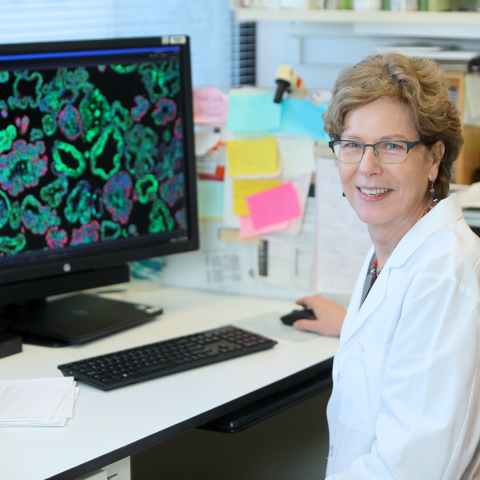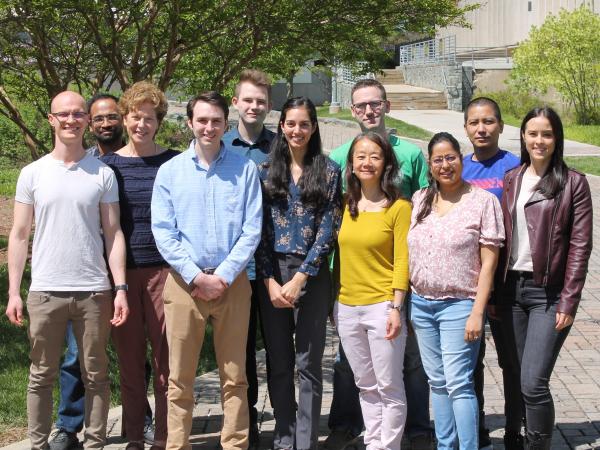
Kathleen Kelly, Ph.D.
For Kathleen Kelly, Ph.D., understanding how to treat prostate cancer begins at the genetic level. In the Laboratory of Genitourinary Cancer Pathogenesis, which Kelly established in 2014, she and her team employ patient-derived organoids and genetically engineered mouse models to explore the genetic mechanisms that lead to prostate cancer development and progression and to preclinically test the application of anti-cancer treatments. By using their platform of more than thirty different models, Kelly and colleagues can test and predict which treatments might work best for a patient before clinical treatment begins.
In the Q&A that follows, Kelly reflected on her career journey, the future of the field and her retirement plans.
Tell me about your career journey. What's been the most surprising thing about it for you?
I always found the biological world very fascinating. I was that kid who asked for a microscope for Christmas. A really formative experience was reading a biography of Madame Curie during elementary school, which opened up my mind to the whole concept of research. When I was in college, I sought out research experiences in biology labs, and after college, I went on to grad school at the University of California, Irvine, where I did a degree in cellular immunology.
The 1970s was when the field of molecular genetics was coming into its own. One of the really surprising and exciting discoveries during that time was that immunoglobulin genes, which code for antibodies, were able to rearrange themselves in the genome. That was the first indication of how much plasticity there could be in an organism’s genetics. I applied to be a postdoc at the NIH with Phil Leder, who was at the forefront of molecular genetics research at the time, and I was very thrilled when I was accepted. Those were really exciting times in molecular biology and in the cancer research field because it was really the early days when oncogenes were first being defined.
It wasn’t only momentous for my career, but it was also momentous personally because I ended up marrying another postdoc in the lab, Ulrich Siebenlist. We finished our postdocs and we went back to NIH in 1984; he worked for the National Institute of Allergy and Infectious Diseases and I became part of the National Cancer Institute. We both had long careers at NIH and two children. He passed away in 2020 from pancreatic cancer.
I was given a leadership opportunity fairly early in my career after I'd been back at the NIH for about 10 years as the department chair in the Medicine Branch. As a fairly young woman, it was a fabulous opportunity. Then upon reorganization, I became the Branch Chief of the Cell and Cancer Biology Lab and I became interested in cancer stem cells, specifically their role in prostate cancer.
As I moved more from very basic research to translational research, I was given another opportunity: this time, to establish a department that emphasized applying cutting-edge research approaches in collaboration with the clinical prostate cancer program at NCI. We're called the Laboratory of Genitourinary Cancer Pathogenesis, and we’re interested in solving clinical problems and having an immediate impact on the lives of cancer patients.
For the past several years, I've worked on castrate-resistant prostate cancer, which is the advanced form of prostate cancer, to determine therapeutic vulnerabilities. In prostate cancer, there's been a very big emphasis on using hormone deprivation therapies, and in some ways, we’ve maybe gotten to the end and exploited that as much as possible. So, I really focused on alternative vulnerabilities with which we can treat advanced prostate cancer.
I also joined the CCR senior leadership as a deputy director about seven years ago, which I've really enjoyed. It's given me a chance to have a bit of an impact on CCR policy, and it's also given me an opportunity to interact with a lot of different scientists in the CCR. It’s particularly been a pleasure to work with the tenure-track investigators and help them get their careers started.
What scientific achievement are you most proud of?
Prostate cancer research is very limited by having relatively few cell lines, and they just don't represent heterogeneous patient populations. Now, they've been used to make really important discoveries, but they're kind of limited in their clinical impact.
What we did was use organoids, which are in-lab model systems of human organs. We ended up establishing a platform of 30 different models that can be used to preclinically test the application of treatments or to test broad concepts across advanced prostate cancer populations. This is very useful for predicting who will and won't respond to a particular treatment as well as looking for biomarkers.
I think that this is going to be particularly important for choosing the most promising treatments to implement in clinical trials because there are always more treatments than there are patients or money for the trials. I'm very proud of that accomplishment.
What do you see as some of the most exciting frontiers in this research field?
The basis of cancer research is really understanding basic principles of cell biology and how these basic principles are hijacked by cancer cells. Every year, there are always fascinating and unpredictable discoveries in our understanding of how cells work.
Right now, I'm really interested in the idea that the way some cancer cells, including advanced prostate cancer and lung cancer cells, escape treatment is by changing their identities, and thus their vulnerabilities. This occurs all the time, so it's always hard to predict what's going to happen.
We’ve got a compendium of ways to treat cancer cells, and we're learning a lot about how they escape those treatments. I believe that combining the appropriate treatments based on our knowledge of basic vulnerabilities combined with mechanisms of resistance will have a real impact on cancer patients’ survival.
Do you have any advice for researchers who are starting their careers here at the CCR, or for future generations of cancer researchers and physicians?
Cancer biology is so complex and multi-dimensional that I think it's going to continue to be important to collaborate with other experts to deepen one's perspective. We can achieve a really impactful synergy between basic and clinical researchers by working together and combining two different perspectives and skill sets to bring new treatments to all kinds of cancer patients.
What are you looking forward to most during your retirement?
I've been fortunate to travel a fair amount in my career, but it's a different kind of travel: what I'm really looking forward to is doing leisurely travel.
I’m a pretty active person, so I'm planning to go to Patagonia eventually, and I've taken up scuba diving. I've got a trip coming up to Southern France — I’ve never been there. I’m looking forward to just being able to stay places for a longer period of time to soak up the ambiance and the culture.
Dr. Kathleen Kelly will retire from CCR on December 30, 2023.
